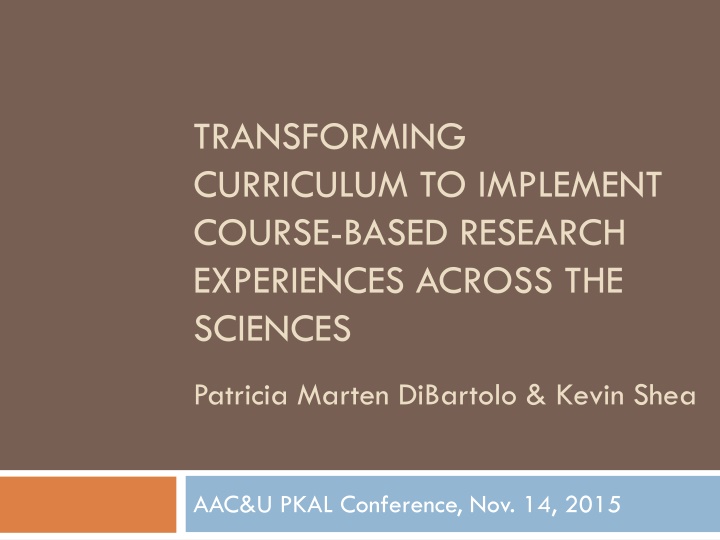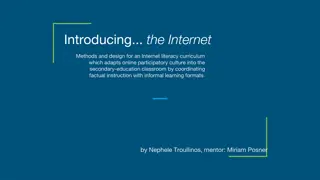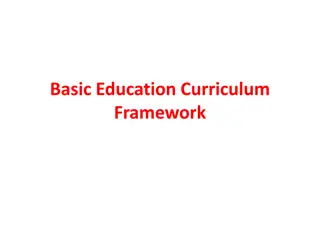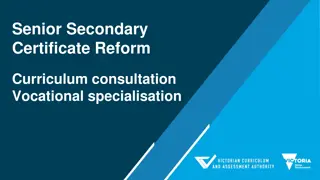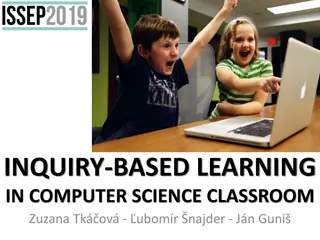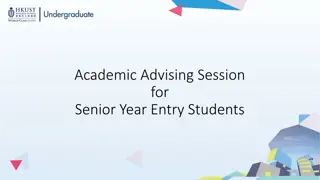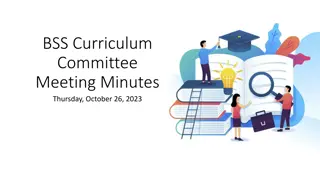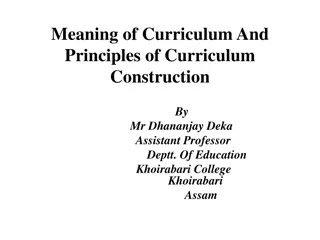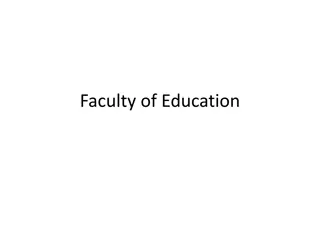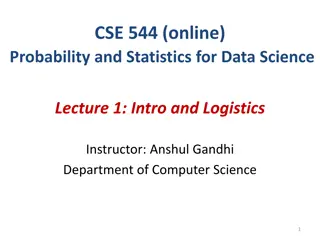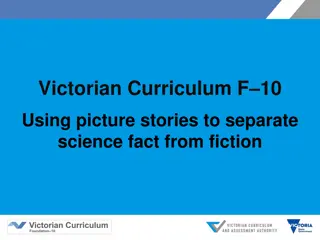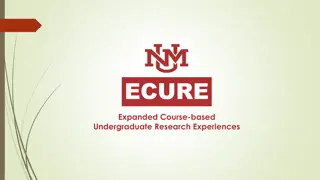Implementing Course-Based Research Experiences in Science Curriculum
Explore the transformation of curriculum to integrate course-based research experiences (CBREs) in the sciences through effective models, challenges, and outcomes. Discover the promise and impact of CBREs, along with real case studies and research plans, to generate meaningful change in teaching and learning.
Download Presentation

Please find below an Image/Link to download the presentation.
The content on the website is provided AS IS for your information and personal use only. It may not be sold, licensed, or shared on other websites without obtaining consent from the author.If you encounter any issues during the download, it is possible that the publisher has removed the file from their server.
You are allowed to download the files provided on this website for personal or commercial use, subject to the condition that they are used lawfully. All files are the property of their respective owners.
The content on the website is provided AS IS for your information and personal use only. It may not be sold, licensed, or shared on other websites without obtaining consent from the author.
E N D
Presentation Transcript
TRANSFORMING CURRICULUM TO IMPLEMENT COURSE-BASED RESEARCH EXPERIENCES ACROSS THE SCIENCES Patricia Marten DiBartolo & Kevin Shea AAC&U PKAL Conference, Nov. 14, 2015
Overview Why? The promise of CBREs How? Models of CBREs No but really how? Implementation challenges and obstacles Now what? Generating change
Why? The Promise of CBREs Long-history for advanced students Growing pressures Need to blur lines between classes and research labs Innovation through piloting
Audience Question What is your why? What do you hope to get out of this session?
How? Models of CBREs There is no one effective model! CBRE principles Importance and impact Discovery and engagement Road bumps and failure Communication Better science and meaningful outcomes
Case Study: Organic II Lab Fall 2014 1 lab section (16 students) of 7 total labs Work in pairs 13 weeks, 3 hours per week Students representative of broader class Not coordinated with lecture
Scientific Goals Promising treatment for lymphatic filariasis Synthesize previously unknown analogs for subsequent biological testing O O O O O HO HO O O O O O O O Neurolenin B Neurolenin A
Research Plan Isolate neurolenin A and B Propose reaction based on Organic I knowledge Find literature procedure Run reaction to make new molecule Purify and analyze reaction Present results poster and paper
No But Really How? Challenges and obstacles What challenges and obstacles do you face in your course, department, or institution?
No But Really How? Challenges and obstacles Case study from Organic Chemistry II lab Student expectations/evaluations Student learning Instructor benefits
Student Quotes Initial Thoughts I know this is mostly because the lab section is experimental, but I would love if the expectations of what we are to do in preparation for and in follow up to lab were more clear. We are given the huge topic of synthesizing molecules, and I am not sure if the expectation is for us to spend one hour outside of class preparing, or ten hours.
Analyzing the Reaction I m a little bit disappointed that we didn t make the product, but I m still really glad that we did the individual projects. I feel like I ve gained more confidence in lab. I think that the experimental lab was a really good idea.
Presenting the Results Well, December sure was a whirlwind! This was a very scary, but very impactful course. Definitely worth the worry! The poster session was so fun, it was great to get to feel knowledgeable and hear other people s feedback. I only wish we had more time.
Overall Reflection I think the experiment-based lab section is good for us in the kinda hellish, mostly intangible, and probably wishful way that eating spinach and waking up early is good for us - in the long run, I believe it will make us better (scientists, people, whatever).
Formal Student Evaluations Instructor created effective learning environment: 3.77 out of 4 (other 6 sections averaged 3.47) Course contributed significantly to my education: 3.85 out of 4 (other 6 sections averaged 3.39)
Grades Students Experimental lab exam performance (n = 14) All other students exam performance (n = 75) Average Grade 434.4 out of 600 (72.4%) 414.2 out of 600 (69.0%) Experimental lab overall course grade (n = 14) All other students overall course grade (n = 75) 3.11 3.02
Post-Test: Overall Course Evaluation 5 4 Mean: 1 = Strongly Disagree -- 5 = Strongly Agree 3 2 1 0 Good way of learning about the subject matter. Good way of learning about the process of scientific research. Positive effect on my interest in science. Experimental Lab N=10 Ask questions and get helpful responses. Other Lab Sections N=42
Post-Test: Chemistry Questions "I have the ability to..." 5 4 Mean of 1--"Not at All" to 5--"A Great Deal" 3 2 1 0 Draw, build, and visualize molecules Predict reaction outcomes Use arrow-pushing mechanisms Identify orbital interactions Propose multistep syntheses Identify structures spectroscopically Identify nucleophiles and electrophiles Experimental Lab Other Lab Sections
Iterative Model Christine Trotta (Biology) 2013-14 Katie McGeough (Chemistry) 2015-16 Ongoing Funding Dreyfus Foundation Thesis Research Faculty-Student Engagement and Project Development Faculty-Student Engagement and Project Development Cycle #1 Cycle #2 Outcomes Dreyfus Grant Summer Research Fellowship 2 Presentations at National Scientific Meeting Course-Based Research Seed Funding Science Center Provost s Office Chemistry Dept Organic II 2014 (1 lab) Organic II 2016 (2 labs)
Now What? Generating Institutional Change Experiment with your obstacles in mind Start small Find your allies Develop evidence and arguments Create eco-systems for change
Now What? Generating change What one or two things can you bring back with you to create change in your course/s, department, or institution?
Questions? Patty DiBartolo, Science Center Director and Professor of Psychology pdibarto@smith.edu Kevin Shea, Professor of Chemistry kshea@smith.edu
Course Schedule Weeks 1-4 isolate neurolenins (literature prep) Week 5 present proposal for novel neurolenin reaction Weeks 6-12 run, purify, and analyze reactions Week 13 present results in public poster session
Grading Project proposal Final paper Poster Journal Preparation and technique Notebook
Informal Evaluations - Pros Having the opportunity to do actual experimental research and learn chemistry in the context of real life applications No weekly lab reports It was really exciting to be doing reactions that weren't fully spelled out for us in a lab manual. We were able to explore reactions that were interesting to us, and I felt really invested in my group's project. This lab section was a lot more interesting than any other general lab section that I've been in. I really liked not having mindless busywork; it felt like we actually had a personal stake in what was happening.
Informal Evaluations - Cons Being almost completely oblivious to the work done in the regular lab sections, and this may have helped understand concepts in lecture This lab definitely took more time than a normal class lab. This lab was a bit overwhelming/demoralizing at times, but not excessively so. Stressing over having no idea what the heck I'm doing. Less practice writing lab reports
What will you take forward? Hoping it will help me stand out as a candidate for a lab internship over the summer. Failure is fun. It has taught me how to be resilient - as a researcher and as a student - and how to move forward when something doesn't go well initially. I can do research with less fear. I learned a lot about how to work with someone that I didn't necessarily jive with. I think that will be really helpful moving on in life in general.
Novel Problem Vs. Traditional Lab This lab experience for me was something I found extremely rewarding. I was much more independent with my approach, problem solving strategies, critical thinking, etc. since we had to do all the research for our experiment on our own. I definitely took charge of this lab experience (with the help of my partner) rather than simply "going with the flow" as I have done in the past. This lab helped me realize what it takes to be a chemist rather than mindlessly running reactions. Lab was less stressful because it was self-guided. Because we were responsible for designing the experiment ourselves, I felt like I understood much more about why we were doing each step, instead of just following instructions like in CHM 222. I definitely felt more invested in and involved with what we were doing in lab. It didn't feel like just a class. In normal lab, if you are having a hard time, there's no real motivation to understand the problem - a million people already did the same thing, so why am I struggling just to do it again?
Post-Test: Course Expectations 5.00 4.50 4.00 Mean: 1 = Strongly Disagree -- 5 = Strongly Agree 3.50 3.00 2.50 2.00 1.50 1.00 0.50 0.00 Will get a high grade Intellectually challenged Exposed to novel ideas Personally enriching Apply in other contexts. Experimental Lab N=10 Other Lab Sections N=42
Post-Test: Chemistry Questions "Presently, I understand..." 5 Mean of 1--"Not at All" to 5--"A Great Deal" 4 3 2 1 0 Experimental Lab Other Lab Sections
Post-Test: Benefits and Learning Gains 5.00 Mean: 1--"No Gain" to 5--"Very Large Gain" 4.00 3.00 2.00 1.00 0.00 Experimental Lab Other Lab Sections
Conclusions and Next Steps Very successful Rewarding teaching experience Sustainable model Dreyfus Foundation funding for 4 total lab sections 2016-2018
